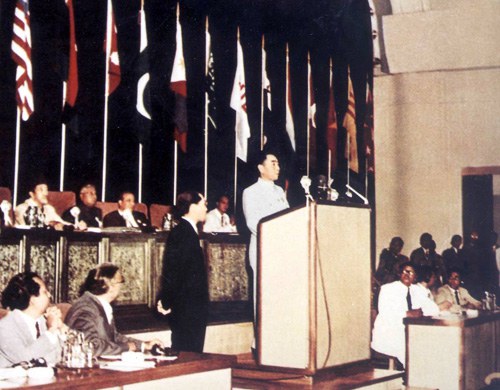

DEMONSTRATING PEACE: Chinese Premier Zhou Enlai expounds on the Five Principles of Peaceful Coexistence during the Bandung Conference in April 1955 in Indonesia (CNSPHOTO)
In recent years, China has made great efforts in safeguarding global security and peace. Years ago, China proposed a new type of future-oriented partnership between the major powers to handle relations with major countries of the world. The concept, featuring equality, cooperation, inclusiveness, and mutual benefit, aims to create reasonable and stable relations among world powers for the sake of avoiding the tragedy of Thucydides' trap.
More recently, at the Fourth Summit of the Conference on Interaction and Confidence Building Measures in Asia, noting that one cannot live in the 21st century with the outdated thinking of Cold War and zero-sum games, China raised a new Asian security concept that stresses common, comprehensive, cooperative and sustainable security to tackle rising challenges facing the region.
And during commemoration of the Five Principles, President Xi underlined the importance of six new key elements-—sovereign equality, common security, common development, win-win cooperation, inclusiveness and mutual learning, as well as fairness and justice.
Qu of the CIIS said that in the modern era of globalization, the Five Principles bear much more significance for international relations as other approaches such as science and the economy influence a country's diplomacy as much as the military. Thus, the world needs the Five Principles far more to handle international relations.
And Xi's new proposal has not only enriched the content of the Five Principles, but also demonstrated the consistency of China's peaceful foreign policy, Qu added.
However, as the Five Principles are only a tenet of international relations, they lack legal weight.
Sun, the senior researcher, said that although they have played a positive role in guiding the world order, the Five Principles are still an idealistic concept. To make full use of this philosophy, the international community needs a series of mechanisms to act as guarantees. "Even an international law should be a possible choice," he added.
Moreover, observers noted the necessity of promoting greater democracy in international relations.
In Xi's speech marking the anniversary, he announced the Chinese Government would establish the Five Principles of Peaceful Coexistence Friendship Award and the Five Principles of Peaceful Coexistence Scholarship of Excellence.
Qu said the move will effectively promote this international philosophy. The award and scholarship will advance the spread of the Five Principles and deepen understanding of the concept among people from all over the world.
Professor Gao of the CFAU suggested that win-win cooperation should be one of the practical approaches to achieving the Five Principles in the new era. China's recent cooperation initiatives such as the Silk Road Economic Belt, the 21st Century Maritime Silk Road, the Bangladesh-China-India-Myanmar Economic Corridor as well as the China-ASEAN Community of Common Destiny are all concrete steps to promote the Five Principles through win-win cooperation.
"With the advancement of multi-polarization, economic globalization and cultural diversity in the world, the mutual interdependence of international community members has gradually deepened and global problems have become more prominent. Thus, only cooperation can help countries to respond to risks and challenges together and ensure peace and development for the whole world," Gao said.
Copyright ©1999-2018
Chinanews.com. All rights reserved.
Reproduction in whole or in part without permission is prohibited.